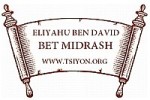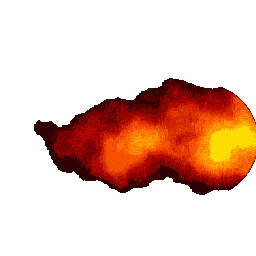Need to talk to us? - In the USA and Canada just call us toll free at (888) 230-2440 for help. Internationally, email us and we will arrange a phone or Skype call for you.
From
Eliyahu
Holy Fire inspires awe! Perhaps the most dramatic sort of Divine manifestation in the Scriptures is in fire. Fire is used in a literal way in most of the several hundred references to fire in the Scriptures. For obvious reasons fire also frequently appears in Scripture as a symbol, and even an instrument, of Yah's anger, judgment and Divine punishment.
Supernatural fire is not always so foreboding, however. Very often, it simply indicates the presence of Elohim in His Glory. We have a powerful example of that in our latest Midrash, as well as an equally powerful example of fire as an indication of Yah's anger, judgment and Divine punishment. These two kinds of holy fire, back to back in the same lesson, make for an exciting and thought provoking Midrash this Sabbath.
The day after this Sabbath is one of the Appointments of YHWH that also involves at least two examples of holy fire. I'm speaking, of course, about Shavuot / Pentecost. Shavuot is said to mark the day YHWH, in blazing fire from atop Mount Sinai, proclaimed the Covenant to Israel. Roughly a millennium and a half later, fifty days after Messiah's death on the tree, and seven days after His ascension to heaven, another amazing visitation took place involving fire.
The festival of Shavu`ot arrived, and the [Messianic] believers all gathered together in one place [in Jerusalem]. Suddenly there came a sound from the sky like the roar of a violent wind, and it filled the whole house where they were sitting. Then they saw what looked like tongues of fire, which separated and came to rest on each one of them. They were all filled with the Ruach HaKodesh and began to talk in different languages, as the Spirit enabled them to speak. Acts 2:1-4 CJB
The "tongues of fire" again indicated the presence of Elohim - this time living inside of those gathered believers via the Ruach HaKodesh, the Holy Spirit! That day the proclamation about Messiah Y'shua began to go out in Jerusalem, and has continued to go out throughout the earth. May all of us add our witness to all of those who have gone before us, as we celebrate this Shavuot.
Blessings and Shalom!
Eliyahu ben David
www.tsiyon.org
________________________________________________________
Questions and answers about Shavuot
Listener Comment - Shavuot (Feast of Weeks)
What is Shavuot all about?
Tsiyon Answer - Shavuot (Feast of Weeks)
Seven Weeks (seven shavuot) is the period starting
on the day after the Passover Sabbath, on the day
when the first fruits of the barley harvest were
waived before YHWH. From
this day forward Israel is
allowed to eat of the new grain. This is the
beginning of the yearly agricultural cycle of
Israel. Over the next seven Sabbath cycles the rest of the barley harvest must come in
and the first fruits of the wheat harvest must
appear. Further, the spring rains during this period
are absolutely necessary for a good harvest for the
rest of the year. That makes these seven Sabbath
cycles extremely important to provide food for the
year. This was a time when Israel was looking to
YHWH to provide the rain, the sunshine and the
growth, all in the right amount, to fuel a bountiful
harvest, on which the whole nation was dependent for
sustenance. That made "the counting of the omer" a
time of waiting and prayer upon YHWH. Think of it as
a counting down toward the wheat harvest, at the end
of which is the celebration of Shavuot (Weeks,
Pentecost) a time of proclaiming the goodness of
YHWH.
Traditionally this entire period is seen as the
period when Israel was delivered from Egypt until
the giving of the Covenant on Mount Sinai, to become
the Covenant nation of YHWH.
This is also the period
between the death of Messiah as our Passover Lamb
and the outpouring of the Ruach, the Holy Spirit, on
Shavuot (Gr. Pentecost). For 40 days during this
period the Risen Lord taught His talmidim
(disciples) about the Kingdom. Before departing from
them He told them; “Don’t depart from Jerusalem, but
wait for the promise of the Father, which you heard
from me. For Yochanan indeed immersed in water, but
you will be immersed in the Holy Spirit not many
days from now.” Act 1:4-5
Thus, the talmidim were waiting and praying, as is
appropriate to this time period. "All these with one
accord continued steadfastly in prayer and
supplication, along with the women, and Miriam the
mother of Y'shua, and with his brothers." Acts 1:14
We know that when the count was over the Holy Spirit
was poured out upon those believers as a first fruit
of what is to come in the Kingdom. Truly, that was
an amazing day! On that day the renewed Israel under
the renewed covenant was empowered for its mission
in this world. (Acts 2)
So, what are we to do
during the count of seven Sabbath cycles, and on
the Shavuot that follows? To wait and pray
until then, as did those first talmidim. And then on
Shavuot to
celebrate and proclaim YHWH and the bounty He has
showered upon us through our Messiah.
[You can consult our Tsiyon calendar to see that
this Sabbath marks the end of the seven Sabbath
periods and sunset of 6/7/14 marks the start of
Shavuot!]
Listener Comment -
Counting the Omer on our Tsiyon Calendar
I
would really appreciate it if you would show the counting of the omer
differently on your calendar. Try
Omer day 1, day 2, day 3, day 4, etc. to 50 days.
Tsiyon Answer
- Counting the Omer on our Tsiyon Calendar
Thanks for your suggestion regarding the
counting of the Omer on our Tsiyon calendar.
However, there is a reason we count by the days of
the Sabbath periods rather than simply counting off
fifty days. After all, this appointment is called
Shavuot (meaning Sabbath weeks) indicating the
counting of Sabbath weeks rather than a simple count
of 50 days. Here's how the counting works:
Start of the Omer Count of 7 Shavuot +1 day to
Pentecost
Seven
shabua (pronounced sha-bu-ah and/or sha-vu-ah)
cycles are to be counted from the day after "the
Sabbath" to bring us to the feast commonly called
"Pentecost." After which Sabbath of the month does
the count begin? Joshua, on first coming into the
Land, kept this on the day beginning the day after
Passover, which is the 2nd Sabbath of the month,
commencing the count on the 15th of the month of
Abib (or Aviv). We know this because no new grain
could be eaten until the offering commencing this shabua count had been made. See verses below.
“Speak to the sons of Israel, and tell them, ‘When you have come into the land which I give to you, and shall reap its harvest, then you shall bring the sheaf of the first fruits of your harvest to the priest: and he shall wave the sheaf before YHWH, to be accepted for you. On the next day after the Sabbath the priest shall wave it. On the day when you wave the sheaf, you shall offer a male lamb without blemish a year old for a burnt offering to YHWH. The meal offering with it shall be two tenth parts of an efah of fine flour mingled with oil, an offering made by fire to YHWH for a pleasant aroma; and the drink offering with it shall be of wine, the fourth part of a hin. You shall eat neither bread, nor roasted grain, nor fresh grain, until this same day, until you have brought the offering of your Elohim. This is a statute forever throughout your generations in all your dwellings. “‘You shall count from the next day after the Sabbath, from the day that you brought the sheaf of the wave offering; seven shavuot shall be completed: even to the next day after the seventh Shabua you shall number fifty days; and you shall offer a new meal offering to YHWH... Lev 23:10-16
Now, notice how Joshua interpreted "the next day after the Sabbath" to mean the day after Passover, the fifteenth of the month.
The children of Israel encamped in Gilgal. They kept the Passover on the fourteenth day of the month at evening in the plains of Jericho. They ate unleavened cakes and parched grain of the produce of the land on the next day after the Passover, in the same day. The manna ceased on the next day, after they had eaten of the produce of the land. The children of Israel didn’t have manna any more; but they ate of the fruit of the land of Canaan that year. Joshua 5:10-12
Notice that we are given specific instructions as to how to count the Omer, and that is NOT day by day. Here are the instructions once again:
“‘You shall count from the next day after the Sabbath, from the day that you brought the sheaf of the wave offering; seven shavuot shall be completed: even to the next day after the seventh Shabua you shall number fifty days; and you shall offer a new meal offering to YHWH... Lev 23:15-16
Notice in verse 15 that we are to count "seven shavuot" (sabbath cycles) to the day after "the seventh Shabua", which equals fifty lunar days. We understand this to mean that the sabbath cycles are what must be counted, plus one more day, which is why we do the counting in the way we do on our calendar. More about this can be found in my book, Holy Time.
________________________________________________________








